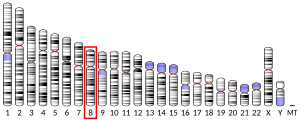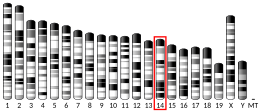From Wikipedia, the free encyclopedia
Protein-coding gene in the species Homo sapiens
Docking protein 2 is a protein that in humans is encoded by the DOK2 gene .[ 5] [ 6] [ 7]
The protein encoded by this gene is constitutively tyrosine phosphorylated in hematopoietic progenitors isolated from chronic myelogenous leukemia (CML) patients in the chronic phase. It may be a critical substrate for p210(bcr/abl), a chimeric protein whose presence is associated with CML. This encoded protein binds p120 (RasGAP) from CML cells.[ 7]
DOK2 has been shown to interact with INPP5D [ 8] TEK tyrosine kinase .[ 9] [ 10]
^ a b c GRCh38: Ensembl release 89: ENSG00000147443 – Ensembl , May 2017^ a b c GRCm38: Ensembl release 89: ENSMUSG00000022102 – Ensembl , May 2017^ "Human PubMed Reference:" . National Center for Biotechnology Information, U.S. National Library of Medicine .^ "Mouse PubMed Reference:" . National Center for Biotechnology Information, U.S. National Library of Medicine .^ Di Cristofano A, Carpino N, Dunant N, Friedland G, Kobayashi R, Strife A, Wisniewski D, Clarkson B, Pandolfi PP, Resh MD (March 1998). "Molecular cloning and characterization of p56dok-2 defines a new family of RasGAP-binding proteins" . J Biol Chem . 273 (9): 4827–30. doi :10.1074/jbc.273.9.4827 PMID 9478921 . ^ Garcia A, Prabhakar S, Hughan S, Anderson TW, Brock CJ, Pearce AC, Dwek RA, Watson SP, Hebestreit HF, Zitzmann N (March 2004). "Differential proteome analysis of TRAP-activated platelets: involvement of DOK-2 and phosphorylation of RGS proteins" . Blood . 103 (6): 2088–95. doi :10.1182/blood-2003-07-2392 PMID 14645010 . ^ a b "Entrez Gene: DOK2 docking protein 2, 56kDa" .^ Dunant NM, Wisniewski D, Strife A, Clarkson B, Resh MD (2000). "The phosphatidylinositol polyphosphate 5-phosphatase SHIP1 associates with the dok1 phosphoprotein in bcr-Abl transformed cells". Cell. Signal . 12 (5): 317–26. doi :10.1016/S0898-6568(00)00073-5 . PMID 10822173 . ^ Jones N, Dumont DJ (1998). "The Tek/Tie2 receptor signals through a novel Dok-related docking protein, Dok-R". Oncogene . 17 (9): 1097–108. doi :10.1038/sj.onc.1202115 . PMID 9764820 . S2CID 20187169 . ^ Master Z, Jones N, Tran J, Jones J, Kerbel RS, Dumont DJ (2001). "Dok-R plays a pivotal role in angiopoietin-1-dependent cell migration through recruitment and activation of Pak" . EMBO J . 20 (21): 5919–28. doi :10.1093/emboj/20.21.5919 . PMC 125712 PMID 11689432 .
Jiang H, Harris MB, Rothman P (2000). "IL-4/IL-13 signaling beyond JAK/STAT" . J. Allergy Clin. Immunol . 105 (6 Pt 1): 1063–70. doi :10.1067/mai.2000.107604 PMID 10856136 . Jones N, Dumont DJ (1998). "The Tek/Tie2 receptor signals through a novel Dok-related docking protein, Dok-R". Oncogene . 17 (9): 1097–108. doi :10.1038/sj.onc.1202115 . PMID 9764820 . S2CID 20187169 . Jones N, Dumont DJ (2000). "Recruitment of Dok-R to the EGF receptor through its PTB domain is required for attenuation of Erk MAP kinase activation" . Curr. Biol . 9 (18): 1057–60. doi :10.1016/S0960-9822(99)80458-8 PMID 10508618 . S2CID 18831513 . Némorin JG, Duplay P (2000). "Evidence that Llck-mediated phosphorylation of p56dok and p62dok may play a role in CD2 signaling" . J. Biol. Chem . 275 (19): 14590–7. doi :10.1074/jbc.275.19.14590 PMID 10799545 . Dunant NM, Wisniewski D, Strife A, et al. (2000). "The phosphatidylinositol polyphosphate 5-phosphatase SHIP1 associates with the dok1 phosphoprotein in bcr-Abl transformed cells". Cell. Signal . 12 (5): 317–26. doi :10.1016/S0898-6568(00)00073-5 . PMID 10822173 . Némorin JG, Laporte P, Bérubé G, Duplay P (2001). "p62dok negatively regulates CD2 signaling in Jurkat cells" . J. Immunol . 166 (7): 4408–15. doi :10.4049/jimmunol.166.7.4408 PMID 11254695 . Grimm J, Sachs M, Britsch S, et al. (2001). "Novel p62dok family members, dok-4 and dok-5, are substrates of the c-Ret receptor tyrosine kinase and mediate neuronal differentiation" (PDF) . J. Cell Biol . 154 (2): 345–54. doi :10.1083/jcb.200102032 . PMC 2150770 PMID 11470823 . Master Z, Jones N, Tran J, et al. (2001). "Dok-R plays a pivotal role in angiopoietin-1-dependent cell migration through recruitment and activation of Pak" . EMBO J . 20 (21): 5919–28. doi :10.1093/emboj/20.21.5919 . PMC 125712 PMID 11689432 . Strausberg RL, Feingold EA, Grouse LH, et al. (2003). "Generation and initial analysis of more than 15,000 full-length human and mouse cDNA sequences" . Proc. Natl. Acad. Sci. U.S.A . 99 (26): 16899–903. Bibcode :2002PNAS...9916899M . doi :10.1073/pnas.242603899 PMC 139241 PMID 12477932 . Salomon AR, Ficarro SB, Brill LM, et al. (2003). "Profiling of tyrosine phosphorylation pathways in human cells using mass spectrometry" . Proc. Natl. Acad. Sci. U.S.A . 100 (2): 443–8. Bibcode :2003PNAS..100..443S . doi :10.1073/pnas.2436191100 PMC 141014 PMID 12522270 . Jones N, Chen SH, Sturk C, et al. (2003). "A unique autophosphorylation site on Tie2/Tek mediates Dok-R phosphotyrosine binding domain binding and function" . Mol. Cell. Biol . 23 (8): 2658–68. doi :10.1128/MCB.23.8.2658-2668.2003 . PMC 152553 PMID 12665569 . Master Z, Tran J, Bishnoi A, et al. (2003). "Dok-R binds c-Abl and regulates Abl kinase activity and mediates cytoskeletal reorganization" . J. Biol. Chem . 278 (32): 30170–9. doi :10.1074/jbc.M301339200 PMID 12777393 . Gérard A, Favre C, Garçon F, et al. (2004). "Functional interaction of RasGAP-binding proteins Dok-1 and Dok-2 with the Tec protein tyrosine kinase". Oncogene . 23 (8): 1594–8. doi :10.1038/sj.onc.1207283 . PMID 14647425 . S2CID 11822165 . Brill LM, Salomon AR, Ficarro SB, et al. (2004). "Robust phosphoproteomic profiling of tyrosine phosphorylation sites from human T cells using immobilized metal affinity chromatography and tandem mass spectrometry". Anal. Chem . 76 (10): 2763–72. doi :10.1021/ac035352d . PMID 15144186 . Gerhard DS, Wagner L, Feingold EA, et al. (2004). "The status, quality, and expansion of the NIH full-length cDNA project: the Mammalian Gene Collection (MGC)" . Genome Res . 14 (10B): 2121–7. doi :10.1101/gr.2596504 . PMC 528928 PMID 15489334 . Rush J, Moritz A, Lee KA, et al. (2005). "Immunoaffinity profiling of tyrosine phosphorylation in cancer cells". Nat. Biotechnol . 23 (1): 94–101. doi :10.1038/nbt1046 . PMID 15592455 . S2CID 7200157 . Van Slyke P, Coll ML, Master Z, et al. (2005). "Dok-R mediates attenuation of epidermal growth factor-dependent mitogen-activated protein kinase and Akt activation through processive recruitment of c-Src and Csk" . Mol. Cell. Biol . 25 (9): 3831–41. doi :10.1128/MCB.25.9.3831-3841.2005 . PMC 1084282 PMID 15831486 .
PDB gallery
2d9w : Solution structure of the PH domain of Docking protein 2 from human
2dlw : Solution structure of the IRS domain of human docking protein 2, isoform a







